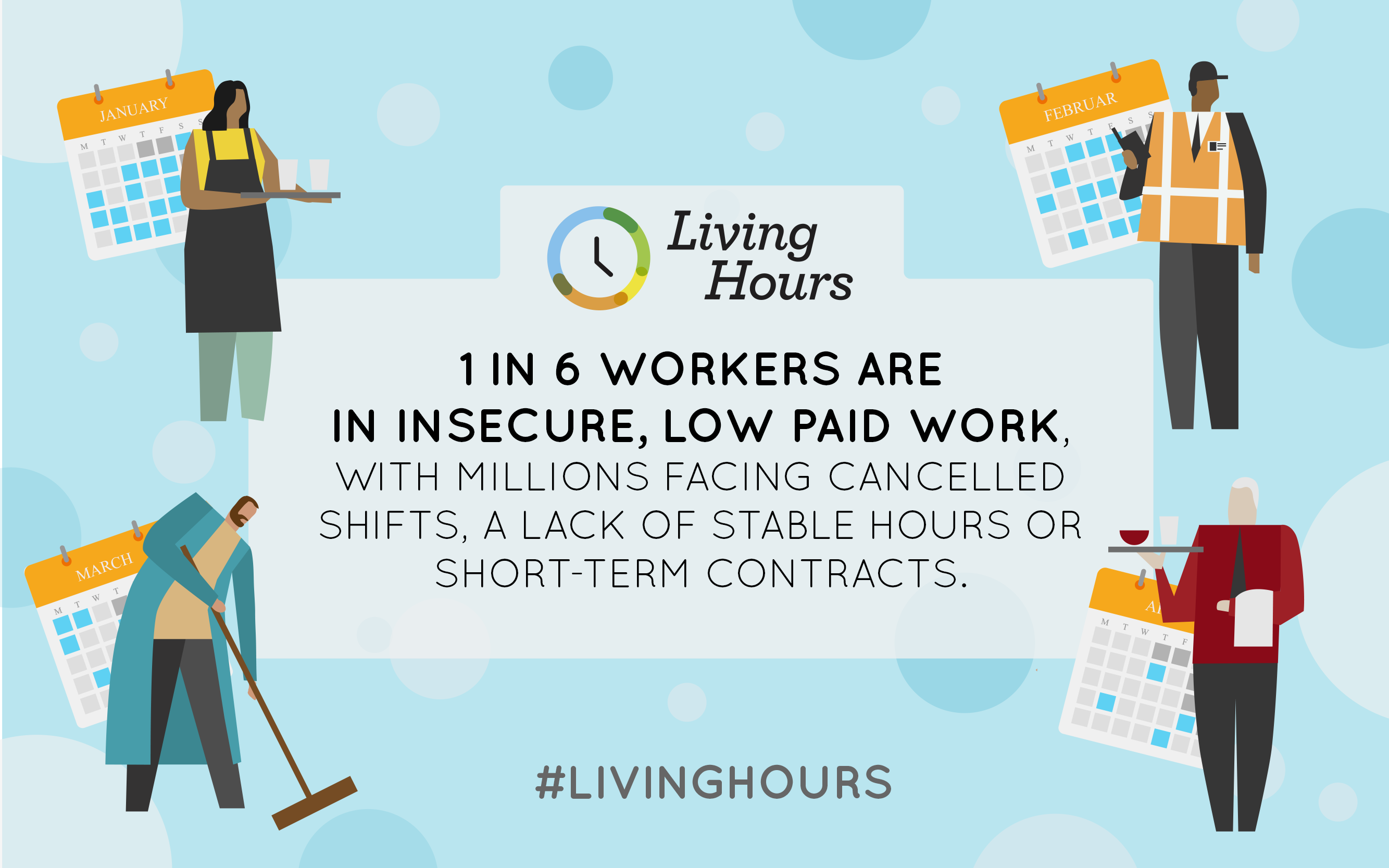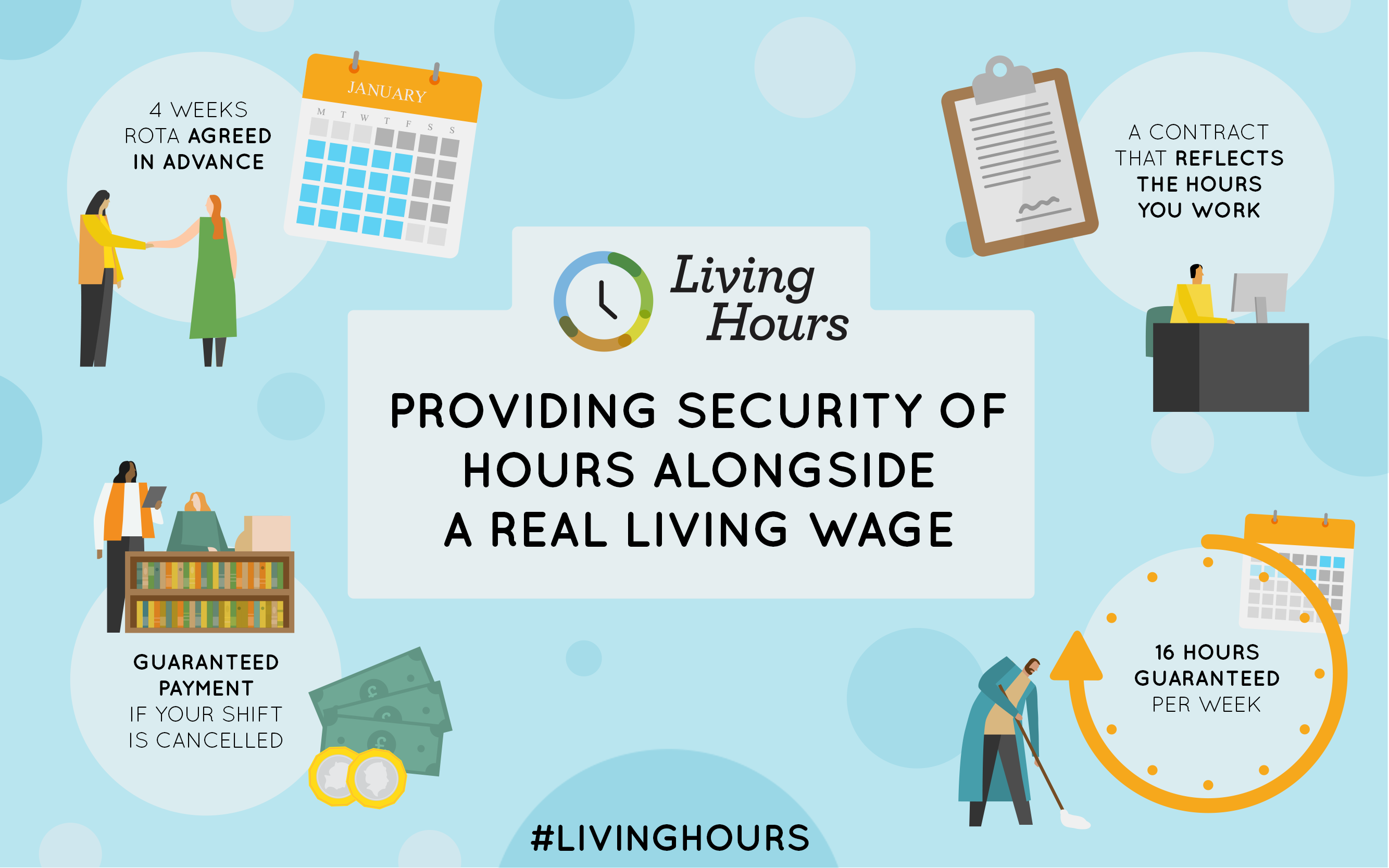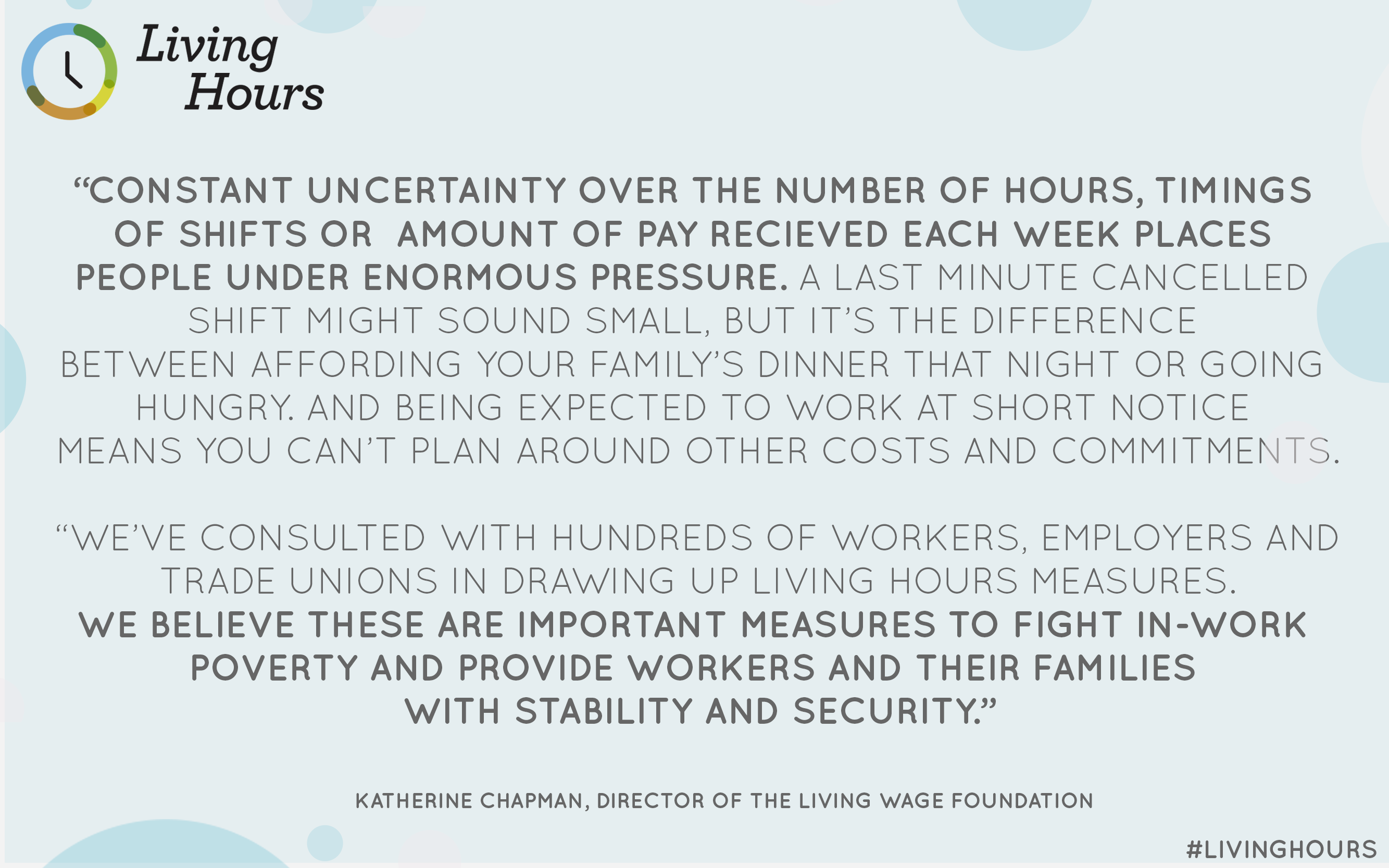New research finds one in six workers are in insecure, low paid work, with millions facing cancelled shifts, a lack of stable hours, or short-term contracts

- Over 5 million (5.1m) workers earn less than the real Living Wage and are in a form of insecure work, 2 million of which are parents
- Wales, the North East and the West Midlands have the highest rates of low paid, insecure work, with Scotland, the South East and London the lowest
- Living Wage Foundation launches new programme with FTSE 100 employers, Living Hours, to provide workers with guaranteed shift patterns and a minimum number of hours
The Living Wage Foundation has today launched Living Hours, a major new programme to tackle widespread insecurity over hours and provide workers with real control over their lives. The scheme will require organisations to pay the real Living Wage and commit to provide workers with at least four weeks' notice of shifts, a contract that accurately reflects hours worked, and a contract with a guaranteed minimum of 16 hours a week. Organisations that agree to these measures will be accredited as Living Hours employers alongside their Living Wage accreditation.
The announcement comes as new research commissioned by the Living Wage Foundation has revealed that one in six, or around 5 million workers, are in low paid, insecure forms of work, including short-term contracts, and contracts with unpredictable pay and hours. The research found:
- 2 million workers in low paid, insecure work are parents
- Over a fifth (22%) of workers aged 16-24 are in low paid, insecure work, and in most types of insecure work measured, young people are worst affected.
- However, insecurity is not just a problem for young people - 1 in 2 employed people (46%) experiencing insecurity and low pay at work are over the age of 35
- Over a fifth (21%) of the working population in Wales experiences low paid, insecure work, and 18% in the North East, compared to 15% in London and 13% in Scotland.
- Those from black and minority ethnic backgrounds are disproportionately affected: 15% of white people in work are experiencing low pay and insecurity in comparison to 17% of workers from mixed/multiple ethnic groups, 17% of Asian/Asian British workers and 17% of Black/African/Caribbean/Black British workers

Major Living Wage employers including Richer Sounds, SSE and Standard Life Aberdeen have committed to sign up to the scheme, and the Living Wage Foundation expects other employers to sign up over the coming months.
Katherine Chapman, Director of the Living Wage Foundation, said:
"The Living Wage has put almost £1bn extra into the pockets of more than 200,000 workers, but it's increasingly clear that pay is not the only driver of in-work poverty. A lack of secure, stable hours is leaving millions of families struggling to keep their heads above water. This isn't good for workers or businesses.
"Constant uncertainty over the number of hours, timings of your shifts or the amount of pay you'll get each week places people under enormous pressure. A shift cancelled at the last minute might sound small, but it can be the difference between being able to pay for your family's dinner that night or going hungry. And being expected to work at short notice means you can't plan around other costs and commitments.
"We've consulted with hundreds of workers, employers and trade unions in drawing up these measures to ensure they are ambitious but achievable. We believe Living Hours will provide an important new measure to fight in-work poverty and to provide workers and their families with stability and security."

Julian Richer, Founder and Managing Director of Richer Sounds, said:
"If you treat the people who work for you well, you're going to have happier, more motivated staff, and ones that stay with you for years. That makes a huge difference, and that's what I've found paying the Living Wage. We just need more businesses to realise this. Offering Living Hours is a great way to provide workers with security, but it's also going to help businesses in the long-run."
John Stewart, Director of HR at SSE, said:
"The Living Wage campaign has made huge strides in ending in-work poverty. But there is another side of the coin: the number of hours worked and the security of those hours.
"This brand-new campaign to create an employer culture of Living Hours has the potential to do so much more and as a business we are very proud to be a part of it."
A former theme park worker, who wishes to remain anonymous, said:
"Working on a zero hours contract for three years made me feel exhausted and negatively affected my mental health. Our rota for the week was sent out on Sunday evenings and, with shifts regularly changing, I couldn't plan my week and always felt that I had to be available to work. I also worked as a 'breaker', which meant spending the whole day at work but only being paid for the couple of hours a day spent covering other colleagues' shifts when they took a break. If the weather was bad or suddenly turned, the theme park would be closed and everyone sent home. Sometimes this meant giving up a whole day but only being paid for an hours' work, or not at all. I've since moved to a new job which has a full-time contract, which means I'm able to save money and plan my week to spend time with family."
Phillip, who works at a national delivery service, said:
"I worked on a zero hours contract for four years where I had no rights, didn't get holidays and had to work back the time for any bank holidays taken. I have three small children to look after and not knowing my shift patterns until a week before made it difficult to plan time together and organise childcare. Now I've moved on to a permanent contract that reflects my hours I feel more valued by my employer and can plan ahead to put money aside."
| Region | Number of people in low paid, insecure work | |||
|---|---|---|---|---|
| North East | 217,750 | |||
| North West | 554,548 | |||
| Yorkshire and the Humber | 388,167 | |||
| East Midlands | 353,602 | |||
| West Midlands | 458,154 | |||
| East of England | 455,160 | |||
| London | 807,430 | |||
| South East | 606,749 | |||
| South West | 455,045 | |||
| Wales | 300,969 | |||
| Scotland | 342,788 | |||
| Northern Ireland | 129,455 |
READ THE LIVING HOURS REPORT
Our report highlights the extent of insecure and precarious work practices which is hitting those on the lowest incomes hardest. It also lays out our latest programme: Living Hours.

Notes to editors
For all media enquiries contact John Hood at john.hood@livingwage.org.uk or 07507 173 649
